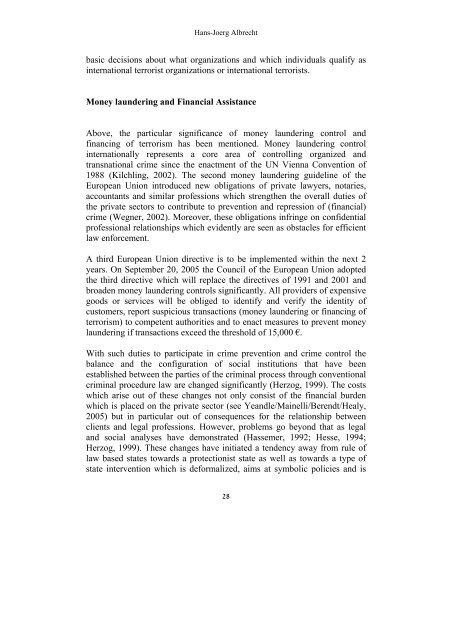222467to222472
222467to222472
222467to222472
Create successful ePaper yourself
Turn your PDF publications into a flip-book with our unique Google optimized e-Paper software.
Hans-Joerg Albrecht<br />
basic decisions about what organizations and which individuals qualify as<br />
international terrorist organizations or international terrorists.<br />
Money laundering and Financial Assistance<br />
Above, the particular significance of money laundering control and<br />
financing of terrorism has been mentioned. Money laundering control<br />
internationally represents a core area of controlling organized and<br />
transnational crime since the enactment of the UN Vienna Convention of<br />
1988 (Kilchling, 2002). The second money laundering guideline of the<br />
European Union introduced new obligations of private lawyers, notaries,<br />
accountants and similar professions which strengthen the overall duties of<br />
the private sectors to contribute to prevention and repression of (financial)<br />
crime (Wegner, 2002). Moreover, these obligations infringe on confidential<br />
professional relationships which evidently are seen as obstacles for efficient<br />
law enforcement.<br />
A third European Union directive is to be implemented within the next 2<br />
years. On September 20, 2005 the Council of the European Union adopted<br />
the third directive which will replace the directives of 1991 and 2001 and<br />
broaden money laundering controls significantly. All providers of expensive<br />
goods or services will be obliged to identify and verify the identity of<br />
customers, report suspicious transactions (money laundering or financing of<br />
terrorism) to competent authorities and to enact measures to prevent money<br />
laundering if transactions exceed the threshold of 15,000 €.<br />
With such duties to participate in crime prevention and crime control the<br />
balance and the configuration of social institutions that have been<br />
established between the parties of the criminal process through conventional<br />
criminal procedure law are changed significantly (Herzog, 1999). The costs<br />
which arise out of these changes not only consist of the financial burden<br />
which is placed on the private sector (see Yeandle/Mainelli/Berendt/Healy,<br />
2005) but in particular out of consequences for the relationship between<br />
clients and legal professions. However, problems go beyond that as legal<br />
and social analyses have demonstrated (Hassemer, 1992; Hesse, 1994;<br />
Herzog, 1999). These changes have initiated a tendency away from rule of<br />
law based states towards a protectionist state as well as towards a type of<br />
state intervention which is deformalized, aims at symbolic policies and is<br />
28


